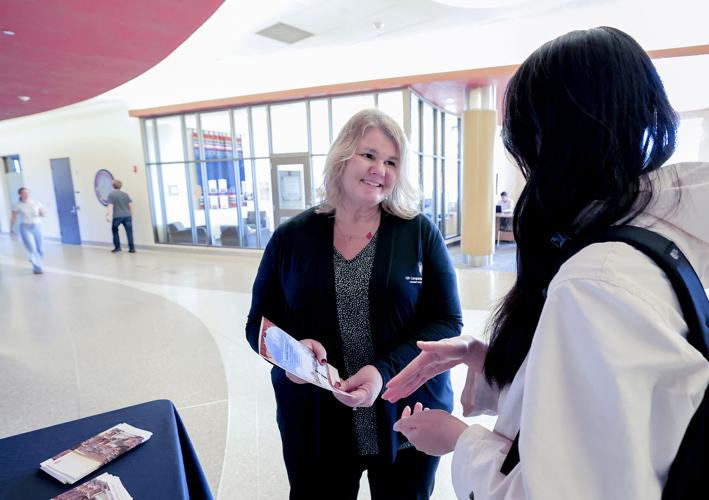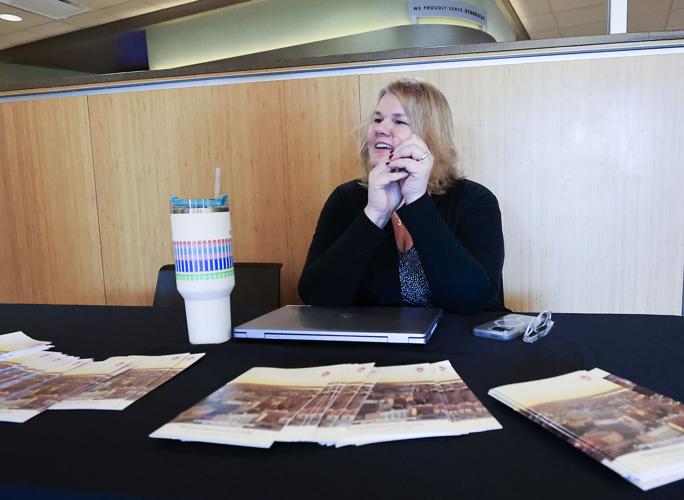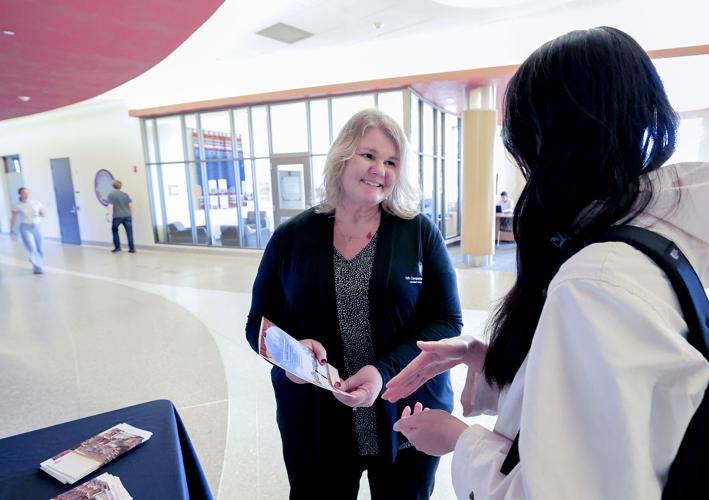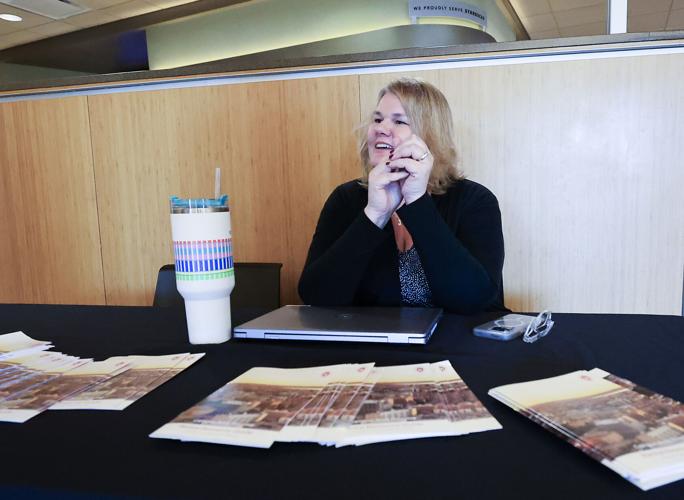Erin Warner is a Badger mom who learned the hard way how difficult the housing market can be to navigate.
Years ago, before Warner became the off-campus housing specialist for UW-Madison’s University Housing Division, her own daughter found herself accidentally locked into two different off-campus housing leases. It took months to resolve.
Now, Warner can be seen all around campus, especially in the fall months, tabling outside dining halls, the unions and residence hall coffee shops in an attempt to try to educate students on how, where and when to search for off-campus student housing. She’s in her second fall leasing season. Students stop at her table to ask if they can take a brochure and leave with a problem-solver in their corner.
“Every student, no matter where they’ve come from, has got somebody in their life ... a mom, a dad, a grandparent, an aunt and uncle, a sibling, that can show them that mix of the cuddle and the push,” Warner said. “There’s so many roles on campus where they can’t do that for a student, and the role that I play on campus, I can do that. I have a natural sense if the student approaching me needs the cuddle or needs the push, and sometimes they need both in the same conversation.
People are also reading…
“Sometimes they just need a little reassurance that they’re not behind, that they’re doing everything right, that it’s not too late, that they haven’t done anything wrong, that they haven’t missed a deadline.”
The questioning always starts the same: What is your budget? It’s something she finds students often don’t talk about with their would-be roommates, sometimes causing strife or heartbreak later when the place the group settles on is affordable for some but not all. Then Warner moves to needs and preferences: Do you want your own bedroom? What neighborhood do you want to live in?
For multiple students, Warner was able to pull suggestions off the top of her head, only opening her computer to confirm what she already knew. The conversations were still somewhat easy, she told the Wisconsin State Journal, as many of the students were looking for their own bedrooms at a price point around $700 to $800. It’ll get harder as the weeks go on options dwindle.
Sometimes, Warner is the first person to teach students, many who will be first-time renters, what they should expect of their landlords. As Warner tabled in Dejope Dining Hall last week, one student gleamed as she described how an apartment she toured at offered “free maintenance” — she’d thought she’d found an amazing deal. No, Warner abruptly corrected her, landlords should always be providing free maintenance.
Every conversation ends with: If you need help, email me. We’ll get it figured out.
Warner was hired out of the College of Letters and Sciences in April 2023 after a tumultuous off-campus signing season for undergraduates six months earlier. Then, as many landlords increased their rates by triple-digits, students scrambled to find affordable housing, with some sleeping overnight outside of leasing offices to be first in line.
The job is very cyclical, Warner said. Fall is dominated by the undergraduate lease-signing season, which starts just weeks after the start of the school year; the spring and summer months are for graduate students who are either just getting accepted to their programs or waiting to learn if they’ll be employed as research or teaching assistants. The rest of the time, Warner is visiting with landlords and checking out apartments, especially ones that are well-maintained and managed.
What challenges are students facing in the off-campus housing market?
The challenges vary a little bit based on the student. For first-year students, the biggest challenge is the timeline. They have barely found their classes, and they’re already feeling like they have to sign a lease for a year. In addition to that timeline, it’s pretty common in Madison to save money on rent or to make rent more affordable, and to also feel more support and camaraderie, is to have roommates. First-year students haven’t typically met their friend group, or maybe they have but they’re not necessarily sure or their friendships are evolving, and maybe the friends that they have the second week of September aren’t the friends that they would maybe have chosen to live with in February, had they had that time.
Graduate students have unique challenges, and I would say the big one is their admissions come in typically in winter or spring. So they’re (searching) off the normal campus area rental cycle. In addition, if they’re hoping to get a TA fellowship or a research fellowship, they usually don’t hear about those until even longer ... so they don’t necessarily know their budget. They’re coming into the rental market later, so by that time, the inventory is low for options near campus, so they’re looking further out, which means that they’re then often competing with families, service workers, young professionals and the rest of the Madisonians.
What do you hear from concerned parents?
Parents are a wide range. Some are just basic questions (or) just the sort of, my gosh, I wasn’t expecting to drop my Badger (off) and a few weeks later be dealing with this. It’s the general information I would give the students. Start with a budget, take some time to learn about the various neighborhoods. Does your Badger want roommates? Come up with the wants and needs.
I talk about that a little more with the parents than I do with the students. Most of the parents are in my age bracket, right in the 50-year-old range. And we didn’t necessarily go to school when there were apartments with rooftop pools and some of these high amenities. I’m certainly not knocking them — they’re gorgeous, and they meet a need for a lot of students — but I didn’t know they existed until my own students were here. I talk a little bit more about that with parents so they understand that, yes, these (luxury apartments) are there, but there are also a wide range of options.
I get some parents that are upset. I would say the most common thing parents feel that they were maybe not aware of is they assumed that their student could stay in the residence halls. Although the university does make it clear ... that sort of doesn’t always sink in with families, and understandably so, right? I mean, there’s a lot of balls in the air, and so then when that sort of realization hits, some families feel that they were misled or feel upset, nervous or panicked.”
How do you help manage the emotions?
The first thing is really seeing if it is a true crisis, because students will come to me and say, ‘I’m worried I’m going to be homeless,’ and so I have to take that seriously. And is it truly a risk? Because the university does have resources in place to help students if that truly is a risk. And in my experience, in most cases, it isn’t a true risk, right? Most students that come to me, it isn’t so much a risk, it’s a fear, and for them, it is a real fear. It’s the anvil looming over their head, like the old cartoons.
And so while to you, or I, or somebody reading this, it may seem like, oh my gosh, they’ve got 10 months. The reality is, a student that comes to me in October to look for housing, I have 1,000 options for them. A student that comes to me in February, for example, for housing has hundreds of options. A student that comes to me in July or August has dozens of options. I haven’t come to a situation where the options are gone.


















